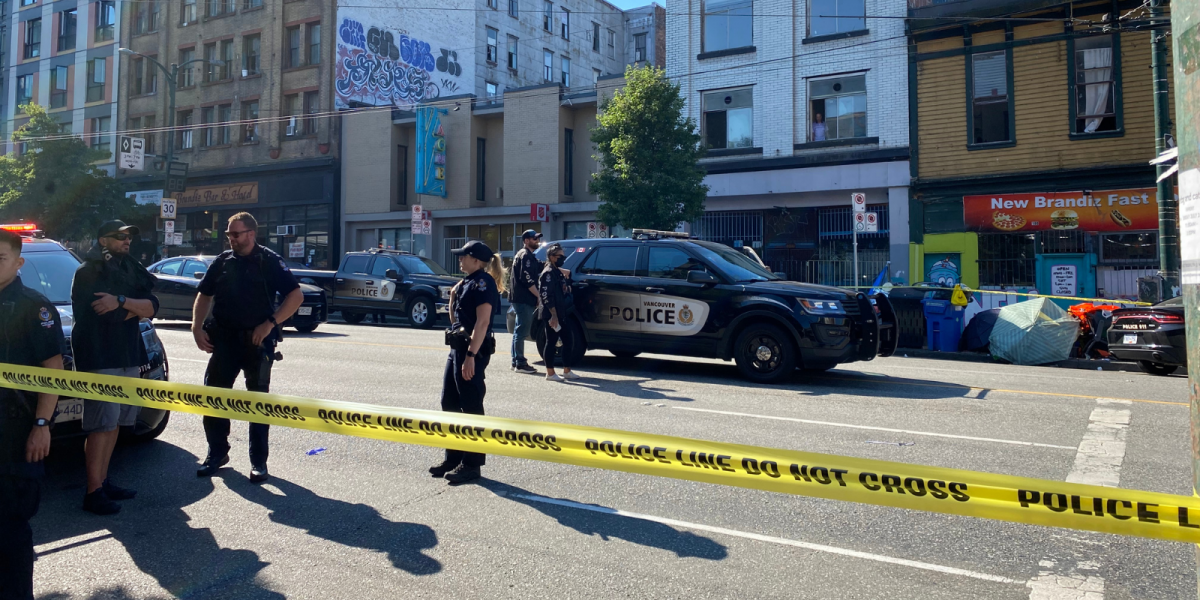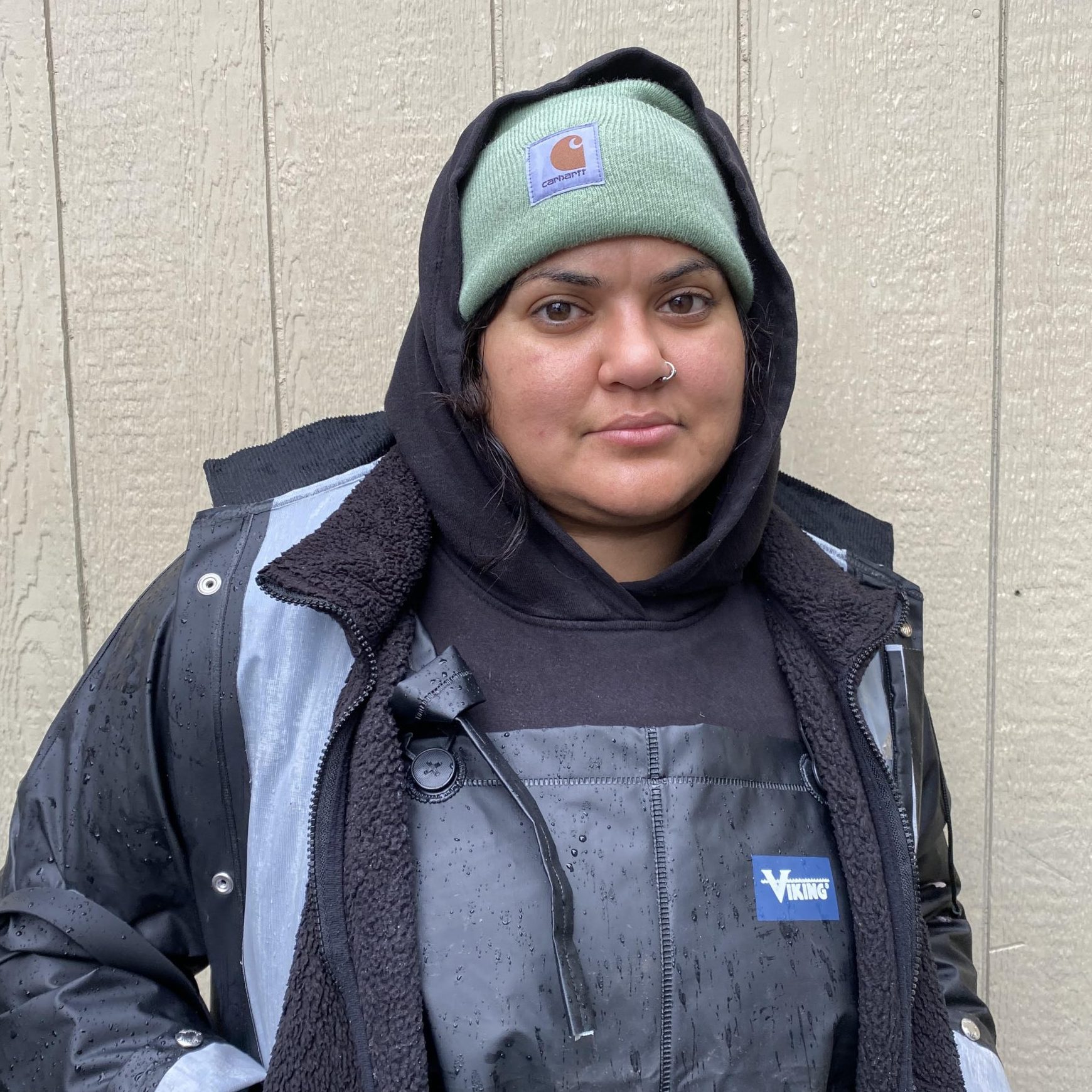This past weekend, the documentary Stop The Sweeps Part I: Policing and Displacement in Vancouver’s Downtown Eastside premiered to a packed auditorium at the Japanese Hall. The documentary was recorded over 18 months and the screening was an opportunity to come together and strategize to end forced evictions.
For filmmaker Ryan Sudds, this documentary was a tool to continue organizing.
“This documentary attempts to stand with residents who fought back and continue to fight back against street sweeps, while also working to make the City of Vancouver and Vancouver Police more accountable for their behaviour in the Downtown Eastside,” said Sudds.
Nearly two years prior, in September 2021, a much sparser crowd filled the tables at an event jointly organized by Pivot Legal Society and Defund 604 Network. At that time, local organizers from the Downtown Eastside (DTES) – including folks from the Coalition of Peers Dismantling the Drug War and Overdose Prevention Society discussed the very real harms of street sweeps.
Earlier that same year, Tyee journalist Jen St. Denis reported on the “unprofessional and disrespectful” actions of city employees during their “sweeps” of Hastings. – which occurred multiple times each day. These sweeps are a thinly-veiled attempt to break up any sense of community between unhoused neighbours under the guise of keeping the city clean. The sweeps allow senior city staff to put on a charade of “addressing homelessness” and the Vancouver Police Department (VPD) to ensure their presence on the block is unmistakably intimidating.
Street sweeps kill our friends and neighbours
In April of 2023, the City of Vancouver led by Mayor Ken Sim and his ABC supermajority made their mark on ending homelessness in Vancouver. They relied on a tried, tested, and true method: forced eviction.
The decampment of Hastings Tent City marked the 10th displacement of a tent city in as many years. City workers, flanked by dozens of armed VPD officers, shut down city blocks throughout the DTES for days. Despite massive outcry – from Hastings Tent City residents, advocates, and statements from unions such as CUPE BC (though no commitment to end their workers’ role in the sweep) and the Hospital Employees Union – the sweep rolled through the neighbourhood. At the time, Mayor Sim claimed “an empathetic and compassionate approach” though it was later revealed that “officials knew there would not be enough beds to shelter people who were displaced.”
Amidst the municipal violence, dissent has led to incredible grassroots responses.
First and foremost, from the folks living on the block themselves. I joined the street sweep counter-patrol in the fall of 2021 and heard directly from folks sheltering on Hastings about the tactics they used to keep themselves and their personal property safe. Warnings on the block, using wheels to move quickly, and supporting disabled friends and family to pack up so they wouldn’t lose their possessions are all tactics that help people keep eachother safe.
The DTES is also home to displaced Indigenous people.The colonial carceral state known as Canada has forced many Indigenous people into “diaspora” through, the architecture of the Indian Act, inadequate housing and income security on reserves, pervasive racism in the family policing system, and the intergenerational realities of incarceration including in the residential school system, the foster care system, juvie, and adult prisons and jails.
Street sweeps are displacing Indigenous community members constantly – despite the refrains on reconciliation. If you spend a morning on Hastings and watch the sweep, you’ll quickly learn that every child doesn’t matter in this city.
The cruelty is the point
A 2022 jurisdictional scan of street sweeps, prepared by community organizations, describes how street sweeps carefully avoid accountability:
“Using an enforcement strategy that depends primarily on so-called ‘soft tactics’ like move-along orders and threats of legal action, the activity of the street sweeps rarely results in arrest, which shields the practice from public scrutiny by making it less conspicuous in the streets and in official statistics. To this effect, someone unfamiliar with the street sweeps would be forgiven in assuming that the practice exists to clean up Vancouver’s parks and sidewalks.”
The “soft” tactic highlights the layered policing inherent to the sweep. City workers claim police are there to keep them safe, and police claim they are there to uphold public safety. But constant displacement makes everything more dangerous. Interrupting access to healthcare – already precarious in low-income neighbourhoods marked by stark social and economic determinants of health – is catastrophic.
When police have tried to prop up their actions in the neighbourhood in the context of gender-based violence, local agencies that serve women in the DTES quickly countered the copaganda narrative. As the Downtown Eastside Women’s Centre and Battered Women’s Support Services said in a coalition meeting during the April 2023 sweeps: “Encampments are unsafe and people should be housed. Moving people along doesn’t make anyone safe, it puts them more at risk, especially women.”
And of course, city and police officials have frequently attempted to pit the DTES and Chinatown residents against each other, justifying harsher policing practices in light of acts of Anti-Asian racism. Yet, the City of Vancouver’s Development Permit Board unanimously approved a luxury high-rise in Chinatown, despite the vociferous and continuous organizing of a multigenerational, multilingual coalition opposing the Beedie application for #105Keefer.
As artist and organizer, Clare Yow told the permit board last month, “We inherited the legacy of our Chinatown elders who, in the 1960s, took up the fight against urban renewal and the freeway that bulldozed through Hogan’s Alley and would have continued through Chinatown and downtown. We all reap the benefits of that grassroots movement now.”
The city of Vancouver shows no care for anyone who doesn’t shore up its access to capital. And the Vancouver Police Department serves as its willing foot soldiers, themselves bolstered by private donations from developers like Peter Wall.
Looking to each other for collective care
While the street sweep may be the most visible part of the war on the poor in this city, the war remains waged on many fronts including heat dome deaths due to deliberate failures to implement mechanical cooling in low income households, the mythical safe(r) supplies that has got drug war correspondents in a tizzy, or the mass incarceration of Indigenous people in correctional facilities across Canada.
To echo Vancouver Area Network of Drug Users (VANDU) organizer Vince Tao, there is no “policy fix” for these outcomes. These are deliberate, manufactured results that appropriately and accurately reflect the goals of Canadian governments (including municipal, provincial and federal policymakers).
What we can do is organize.
That is what the #StopTheSweeps coalition has been doing for nearly 2 years now – bringing together individuals and representatives from the Coalition of Peers Dismantling the Drug War, Defund 604 Network, Pivot Legal Society, VANDU, and the Vancouver Tenants Union to directly confront the sweeps. Alongside the #StopTheSweeps efforts, there has also been a proliferation of mutual aid – groups like Distro Disco (first formed in the wake of the CRAB Park decampment) have organized a mobile free store to redistribute survival gear and material resources to unhoused neighbours.
No politician or policymaker, or senior government official is coming to save us. They might throw us some busy work, but when it comes to the day-to-day efforts of keeping people alive, responding in the wake of police violence, or sourcing tents and tarps, it is regular people with regular paycheques who are redistributing their wealth.
And, cyclically, “progressive” parties will convince us to redirect our energy to bolstering their (re)election. They see the potential that we – community organizers – carry. They want to discipline the vitality of resistance within their frameworks of governance, but progressive faces in high places still won’t defund the police.
Don’t look to elected officials to resolve social ills. Look to your friends and family, your coworkers and neighbours. At the #StopTheSweeps documentary premiere this weekend, 2-spirit artist Manuel Axel Strain (from the lands and waters of the xʷməθkʷəyəm (Musqueam), Simpcw and Syilx peoples) reminded the audience to take care of ourselves – to take care of each other.
We are all we’ve got.
If you want to join the fight against street sweeps, manufactured poverty and austerity on the unceded territories of the xʷməθkʷəy̓əm, səlilwətaɬ and Sḵwx̱wú7mesh Nations, consider checking out one of these upcoming events:
VANDU Emergency General Meeting, Saturday July 1, 2 PM, 380 E Hastings
Fuck Klanada Block Party, Saturday July 1, 4 PM-late, Woodland Park
Honouring Their Names: Indigenous Justice & Healing, Saturday July 8, 1-3 PM, Grandview Park
For information about future screenings of Screenings of Stop the Sweeps Part I follow @stopsweepsvan and if you would like to arrange a screening, contact Vancouver Tenants Union.
Did you like this article? Help us produce more like it by donating $1, $2, or $5. Donate


